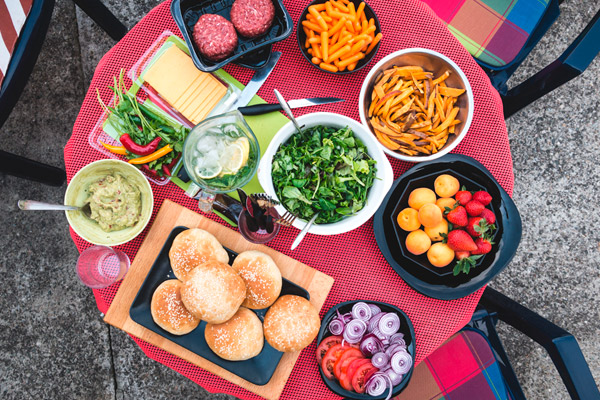Medical expert of the article
New publications
13 rules of good nutrition
Last reviewed: 04.07.2025

All iLive content is medically reviewed or fact checked to ensure as much factual accuracy as possible.
We have strict sourcing guidelines and only link to reputable media sites, academic research institutions and, whenever possible, medically peer reviewed studies. Note that the numbers in parentheses ([1], [2], etc.) are clickable links to these studies.
If you feel that any of our content is inaccurate, out-of-date, or otherwise questionable, please select it and press Ctrl + Enter.

In order for food to be beneficial to you and not lead to excess weight and poor health, you need to eat right. What are the rules of proper and reasonable nutrition?
 [ 1 ]
[ 1 ]
Don't rush
The more thoroughly you chew your food, the better it will be digested and the less fat deposits will be located on your sides and waist. When chewing, food is moistened with saliva and thus digested faster. Saliva contains substances that can kill microbes - thus, food is disinfected. And saliva also contains enzymes that are necessary for preliminary digestion of food. In addition, well-chewed food is easy to swallow, it will not get stuck in your throat as an unpleasant lump.
 [ 2 ]
[ 2 ]
Eat according to the schedule
Eating regularly at the same time disciplines the body and makes it easier for it to digest. It is best to eat at least 5-6 times a day in small portions. This way the digestive system will not be overloaded and will be able to digest and assimilate food evenly.
Don't overeat at night
When you eat a lot and then go to bed, the digestive system works intensively instead of resting. The stomach and intestines wear out and are not able to perform their functions well, take care of them and do not overload them.
Avoid eating dry food
When you wash down your food, you help it to be better digested. However, many nutritionists do not recommend washing down your food with water. It is better to warm up your digestive system with a light soup and salad before eating porridge. The liquid will help the rest of the food move through the digestive tract.
Stop in time
Get up from the table not when you can no longer breathe from overeating, but with a feeling of slight hunger. If you get up from the table with a feeling of a full stomach, this is a sign that you have made a mistake in the way you have just eaten. After you have finished eating, your stomach should not feel empty, but it should not be full either. Get into the habit of eating slowly, it takes about 20 minutes for the brain to receive the signal from the stomach "I do not want any more".
Eat only when you are hungry
Modern culture promotes the idea that a person can get hungry at about 9 am, 12 pm and again at 6 pm. This may be true, but remember that you should not eat at lunch if you are not hungry, and in the evening too. If you get hungry between meals, prepare healthy snacks for yourself. It is bad to starve yourself between meals because when it is finally your turn to eat, you will pounce on it with double the appetite and will definitely exceed the portions. Eat, listening to your body.
 [ 13 ]
[ 13 ]
Reduce portion sizes

Your portions may be too big and you may not even notice. According to research, portion sizes have almost doubled in the last 50 years. Remember that your stomach has not grown in size in that time. You can’t expect your stomach to digest large amounts of food without negative consequences. Many people don’t realize that your stomach will stretch if you are used to eating a lot. If you eat a small amount of food at a time, your stomach will not stretch as much as it does when you cram a large meal into yourself. Give yourself 10 to 20 minutes before getting up from the table. If you are still really hungry after that time, eat a little more.
 [ 14 ]
[ 14 ]
Have breakfast every day
Your metabolism starts working hard early in the morning (it slows down at night because you haven't eaten anything for a while). So eat breakfast, your body will digest this food much more readily than in the evening, and you won't risk gaining weight.
Be physically active
This again speeds up your metabolism, not to mention burns calories. Exercise also increases the activity of the digestive process, speeding up digestion. To get the most out of exercise, try to combine the gym with work, such as running on a treadmill, and weight lifting with pleasure, as well as cycling, hiking, or playing soccer. Exercise can also help you assess whether you are hungry.
 [ 18 ], [ 19 ], [ 20 ], [ 21 ], [ 22 ], [ 23 ]
[ 18 ], [ 19 ], [ 20 ], [ 21 ], [ 22 ], [ 23 ]
Don't fantasize about food
It is a proven fact that watching TV makes you want to eat more. This is because all those mouth-watering commercials give us a close-up look at perfectly cooked dishes. Change the channel if the dishes on the TV screen are too caloric. At the very least, eat some fresh strawberries instead of running to the supermarket for greasy fried chicken. It will save your figure and your nerves.
Don't get calories from drinks
It's a good idea to stick to water or low-calorie drinks like tea or coffee between meals. Sugary drinks and juices can add hundreds of calories to your diet without you even noticing. In fact, carbonated and sugary drinks do nothing for you other than quench your thirst and add calories to your bill throughout the day.
Stock up on an extra plate
Put an extra plate on the table and leave the food you didn't finish on it for tomorrow. After these manipulations, you won't force yourself to eat what you don't want, and you will understand that your part of lunch or dinner is too big. Usually you just ignore it, but this time you will be able to unload your stomach from excess food, and perhaps avoid the feeling of bloating.
 [ 26 ]
[ 26 ]
Don't have any illusions about your own figure.
Don't compare yourself to models and performers on TV. Most people will never be as perfect as they are (unless you can afford a personal trainer and nutritionist to work with you for a few hours every day). Instead, focus on a healthy lifestyle that works best for you.
There is nothing fundamentally new in these rules, they are known to everyone. Meanwhile, many people often neglect them, apparently without thinking about the consequences. To understand the physiological meaning of these recommendations for proper nutrition, check in practice how they work.

